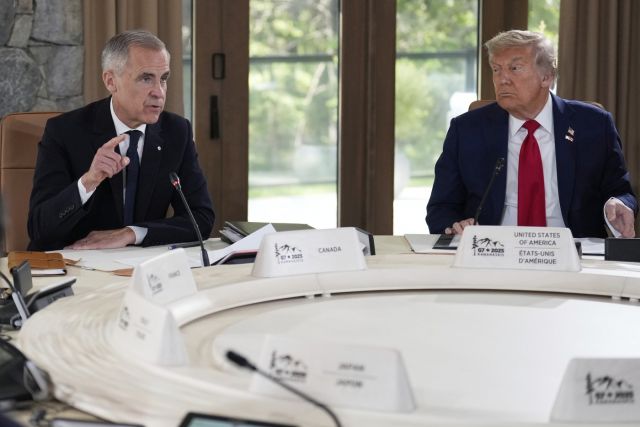Prime Minister Mark Carney says Canada will stand firm in defending its workers and businesses in the face of new tariff threats from U.S. President Donald Trump. In a public post, Carney reaffirmed the federal government’s commitment to securing a fair trade deal with the United States by a new deadline of August 1—extended from the earlier target of July 21.
Trump, in a letter to Carney, warned that he would impose 35 per cent tariffs on Canadian goods unless certain demands are met, including stepped-up efforts by Canada to curb fentanyl trafficking across the border. U.S. Customs data shows that roughly 26 kilograms of fentanyl have been seized at the northern border this fiscal year—an increase over last year but still significantly lower than the nearly 3,700 kilograms seized at the U.S.-Mexico border.
Trump’s letter also reignited trade tensions over Canada’s supply management system, claiming that U.S. dairy farmers face tariffs of up to 400 per cent. Carney, who during the spring election campaign vowed that supply management would “never be on the table,” has not indicated any shift in that stance.
Trump further argued that the U.S. trade deficit with Canada threatens both the American economy and national security, despite the fact that much of the deficit is tied to imports of Canadian oil sold below market value.
A White House official clarified that the proposed 35 per cent tariff would only apply to goods already subject to a 25 per cent import tax, exempting items compliant with the Canada-U.S.-Mexico Agreement (CUSMA), as well as energy and potash imports, which are currently taxed at 10 per cent. The official emphasized that no final decision has been made, nor has a formal policy paper been issued.
The Canadian Chamber of Commerce warned that the proposed tariffs would hurt both countries. President and CEO Candace Laing urged both governments to resume negotiations in good faith and behind closed doors. “These threats jeopardize the most productive trade relationship in the world,” she said.
Labour leaders also pushed back strongly. Unifor National President Lana Payne called Trump’s demands “extortion” and urged Canada to use “every bit of leverage” to protect workers. “Concessions won’t stop a bully, but collective strength will,” she wrote.
Opposition leaders across Canada’s political spectrum also responded. Conservative Leader Pierre Poilievre condemned the tariff threat as an “unjustified attack” and pledged to work toward a strong trade deal by the Prime Minister’s July 21 target. Bloc Québécois Leader Yves-François Blanchet criticized Carney’s focus on oil and gas investments, arguing that they would harm trade and the environment long after Trump leaves office. He also called for stronger trade ties with the European Union.
Meanwhile, Canada is already contending with U.S. tariffs on steel, aluminum, and automobiles—and faces another wave targeting copper beginning August 1. Carney’s government now faces a critical few weeks to steer the country through escalating economic tensions with its largest trading partner.

